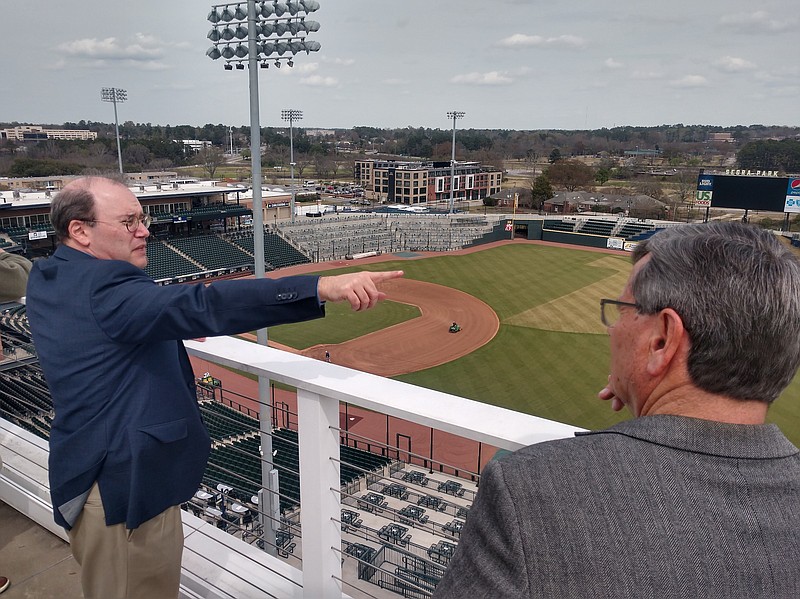Chattanooga's South Broad District is at a tipping point and a deal for a new multi-use stadium just off Interstate 24's entrance to the city needs to get done, some business people in the area said.
"This is a situation bigger than the Chattanooga Lookouts," said Mike Harrell, president of the South Broad Redevelopment Group, about the proposed stadium where the minor league baseball team is viewed as the likely primary user.
Harrell and other members of the community economic development group, in an interview this week, urged state legislators to craft a deal that protects the city and Hamilton County but also unlocks the growth for which stadium supporters see the potential around the proposed facility.
Businesswoman Ann Weeks, the group's president-emeritus, said the South Broad Redevelopment Group has for more than two decades pursued redeveloping the area that's roughly bordered by the Howard School, I-24, the former Wheland Foundry-U.S. Pipe site and Chattanooga Creek.
"We want the legislature to know this is a big deal," she said. "There's something really great coming in here. Please listen to us. This is what our community would like. Try to make that happen."
Chattanooga businessman John Clark, a board member for the redevelopment group, cited a Nashville developer's proposal to build about $150 million in new housing and commercial space around the facility that would go on the mostly vacant and dilapidated 141-acre foundry site.
"The stadium - it's all about much more than baseball," he said.
City and county officials have said they expect more than $1.5 billion in private development, with the stadium as a catalyst.
Last Tuesday, three state legislators from Hamilton County said they are agreeable to allowing local officials to use state sales tax revenues generated within the stadium to help fund the project.
But Sens. Todd Gardenhire, R-Chattanooga, and Bo Watson, R-Hixson, as well as Rep. Patsy Hazlewood, R-Signal Mountain, continue to resist supporting a $13.5 million state grant that city and county officials said is needed to make the project financially feasible.
The price tag for the new stadium is pegged by officials at $86.5 million.
City and county officials have patterned their legislative request after one approved last year for Tennessee Smokies owner Randy Boyd and his plans for a new downtown baseball stadium.
Gardenhire said the difference in Knoxville is that Boyd put up a lot of money for the investment.
"And here, we have not seen any cash put up by individual investors," he said.
Clark said state legislators are "right to drive the best bargain" related to the proposed Chattanooga stadium to replace the aging AT&T Field.
"But let's don't lose sight of what we're trying to get," he said. "Drive it, drive it, drive it and cut a deal. I trust they'll make a good decision."
Harrell said the South Broad group doesn't want to overburden taxpayers.
"But my goodness, there ought to be a way and the motivation to make this work," he said. "What do [legislators] want to see when they come home from Nashville? I'd rather have a ballpark than an outlet mall."
Weeks said the group would seek affordable and workforce housing as part of the new development around the stadium, which is expected to hold 7,000-10,000 spectators.
She also referenced the neighborhood's Black roots.
"We need to honor that," Weeks said, adding that "everyone lives down here."
In addition to the $13.5 million state contribution, the proposal calls for the use of state and local sales tax revenue totaling $15.6 million, incremental property tax revenue of $19.4 million from anticipated adjoining development and non-property tax revenue from the city and county of $8.4 million in a 50/50 split, figures show.
Use of sales tax revenue would help pay off an estimated $63 million in 30-year bonds for construction.
Meanwhile, private money includes annual lease payments by the Lookouts of $19.6 million over the period and $10 million in contributed foundry land. Private sources would pay 35% of the total, city and county estimates show.
Contact Mike Pare at mpare@timesfreepress.com or 423-757-6318. Follow him on Twitter @MikePareTFP.
